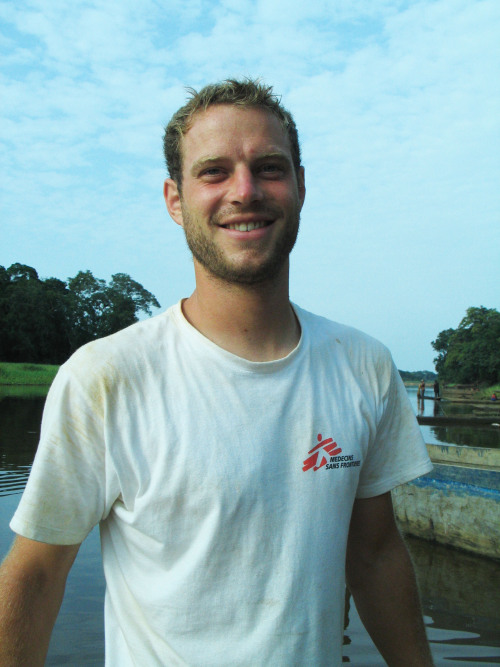Photo by Stefan Dold/MSF
Under any circumstances, it’s not an easy task traveling along muddy rainforest tracks by motorbike and crossing swollen rivers by dugout canoe. Now imagine doing it while carrying a refrigerator. This is exactly what UK native and Doctors Without Borders/Medecins Sans Frontieres (MSF) project coordinator Will Turner and his team will be doing for the next month as they mount an expedition to test 40,000 people in remote villages of Democratic Republic of Congo (DRC) for sleeping sickness.
The mission is taking them to the town of Bili, among other places, in the far north of the country. Bili sits in a heavily forested area between the river Uélé and the border with Central African Republic. The area is a global hotspot for sleeping sickness, a disease transmitted by the tsetse fly that is fatal if it’s not treated. Some 85 percent of all sleeping sickness cases are found in DRC, in fact. But the region is so difficult to reach that the problem has long gone ignored.
“We came to the district because it is in the most active focus of sleeping sickness in the world,” says Turner. “Yet this fatal disease is just not tackled here due to insecurity and the remoteness of the area.”
In early April 2013, MSF’s mobile sleeping sickness team installed a laboratory and treatment ward in Bili hospital and began testing local people for the disease. Once the entire population of the town has been tested, the team will turn its focus to about 50 other villages located deep in the surrounding rainforest. People diagnosed with the disease will be referred to the hospital in Bili.
“The team will be on the road for three to four weeks in a row,” says Turner. “Sometimes they will be on motorbikes to make their way along barely accessible paths through the forest. They will move to a new village every day and sleep in tents. By doing this, we expect to find and cure several hundred infected patients.”
Read more: http://www.doctorswithoutborders.org/news/article.cfm?id=6797&cat=field-news
100 notes
anabelastarbr reblogged this from doctorswithoutborders
anabelastarbr liked this
cinslima liked this
 freedomforeverybody118 liked this
freedomforeverybody118 liked this teatimeandcuddling liked this
oliviabeanlove reblogged this from doctorswithoutborders
trinc84 liked this
coffeeandcrime reblogged this from doctorswithoutborders
 vintagegraceandlace-blog reblogged this from doctorswithoutborders
vintagegraceandlace-blog reblogged this from doctorswithoutborders  first-girraffe-blog-blog liked this
first-girraffe-blog-blog liked this afaanaut reblogged this from doctorswithoutborders
michaelgiles88 liked this
 coffeeanddeaddreams liked this
coffeeanddeaddreams liked this goldmercury liked this
queeros liked this
irischarcoalcolourpencils reblogged this from doctorswithoutborders
papaver--somniferum reblogged this from doctorswithoutborders and added:
I love what they do for people. I hope I am lucky enough to work for MSF some day.
ptiongson-blog liked this
livesalonewithcats reblogged this from doctorswithoutborders
descartes1596 liked this
majesticnomad liked this
carlyechandler reblogged this from doctorswithoutborders
gray-silhouettes liked this
best-street-shark reblogged this from doctorswithoutborders and added:
Does MSF make people sexy, or do they just only hire really beautiful people?
 ucsdhealthsciences liked this
ucsdhealthsciences liked this rakle liked this
wordsprobablyunnecessary liked this
thequietestlilbucket liked this
 beledibabe liked this
beledibabe liked this alesthetique liked this
doctorswithoutborders posted this
- Show more notes

